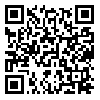Volume 17, Issue 4 (ٌWinter 2023)
jmed 2023, 17(4): 318-333 |
Back to browse issues page
Download citation:
BibTeX | RIS | EndNote | Medlars | ProCite | Reference Manager | RefWorks
Send citation to:



BibTeX | RIS | EndNote | Medlars | ProCite | Reference Manager | RefWorks
Send citation to:
Heydari S, Ghanbari M, Bentolhoda A, Mirzaei M. A Study on the Collaborative Experiences of Faculty Members and Students Health-Oriented Transdisciplinary Process: Convergence of Science for Social Accountability. jmed 2023; 17 (4) :318-333
URL: http://jmed.ssu.ac.ir/article-1-1392-en.html
URL: http://jmed.ssu.ac.ir/article-1-1392-en.html
Professor, Yazd CardiovascularResearch Center, Non-communicable Disease Research Institute, Shahid Sadoughi University of Medical Sciences , masoud_mirzaei@hotmail.com
Abstract: (1567 Views)
Introduction: Transdisciplinary education is necessary for the improvement of life quality and social sustainable development. The convergence of science also provides the opportunity to achieve this goal through collaborative learning and by crossing imaginary boundaries of various fields of knowledge. This study was part of a project titled "Application of artificial intelligence for developing tools for virtual education and counseling for prevention, diagnosis, treatment and self-care of cardiac patients" The aim was to share the experiences of professors and students participating in this transdisciplinary health oriented activity.
Methods: We used a qualitative method in this study. Purposive sampling and data collection was performed through a focused group discussion session and three individual semi-structured interviews. The process of data analysis was based on the Granham and Lundman method, and the accuracy of our data was examined with Guba and Lincoln criteria.
Results: The participants included 22 students and faculty members of various disciplines of medical sciences, engineering and art. Classes and members of qualitative analysis included "individual development" (self-directed learning, self-confidence, responsibility) and "social development" (transdisciplinary vision, academic leadership and social responsibility).
Conclusion: Many of the themes, such as self-directed learning, self-confidence, responsibility and transdisciplinary vision, are hidden curriculum components that students learn through participating in team and problem-solving activities. Interdisciplinary activities are also effective for empowering faculty members in areas like academic leadership and creating a multidisciplinary perspective to respond to the needs of society.
Methods: We used a qualitative method in this study. Purposive sampling and data collection was performed through a focused group discussion session and three individual semi-structured interviews. The process of data analysis was based on the Granham and Lundman method, and the accuracy of our data was examined with Guba and Lincoln criteria.
Results: The participants included 22 students and faculty members of various disciplines of medical sciences, engineering and art. Classes and members of qualitative analysis included "individual development" (self-directed learning, self-confidence, responsibility) and "social development" (transdisciplinary vision, academic leadership and social responsibility).
Conclusion: Many of the themes, such as self-directed learning, self-confidence, responsibility and transdisciplinary vision, are hidden curriculum components that students learn through participating in team and problem-solving activities. Interdisciplinary activities are also effective for empowering faculty members in areas like academic leadership and creating a multidisciplinary perspective to respond to the needs of society.
Type of Study: Research |
Subject:
Medical Education
Received: 2023/01/21 | Accepted: 2023/02/24 | Published: 2023/03/5
Received: 2023/01/21 | Accepted: 2023/02/24 | Published: 2023/03/5
Send email to the article author
| Rights and permissions | |
 |
This work is licensed under a Creative Commons Attribution-NonCommercial 4.0 International License. |







